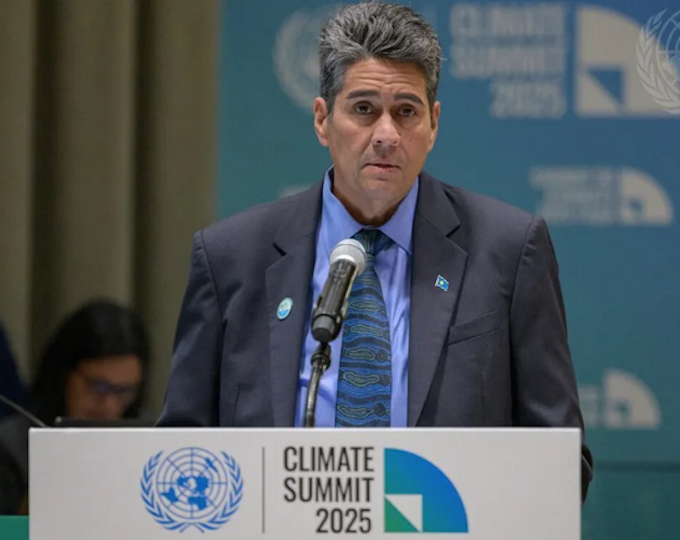
By Caleb Fotheringham, RNZ Pacific journalist
Pacific climate leaders are disappointed that Australia has lost the bid to host the United Nations Climate Conference, COP31, in 2026.
Palau’s President Surangel Whipps Jr said he was “deeply disappointed” by the outcome.
Australia had campaigned for years for the meeting to be held in its country, and it was to happen in conjunction with the Pacific.
- READ MORE: COP30: ‘Ego manoeuvring’ behind scenes at UN climate talks, says Pacific delegate
- ‘Our land is not for sale’: Indigenous people protest at COP30 in Brazil
- Other COP30 reports
The new agreement put forward by Australia’s Climate Minister Chris Bowen is for Bowen to be the COP president of negotiations and for a pre-COP to be hosted in the Pacific, while the main event is in Türkiye.
Bowen told media at COP30 in Belém, Brazil, the new proposal would allow Australia to prepare draft text and issue the overarching document of the event, while Türkiye will oversee the operation side of the meeting.
In a statement, Whipps said the region’s ambition and advocacy would not waver.
“A Pacific COP was vital to highlight the critical climate-ocean nexus, the everyday realities of climate impacts, and the serious threats to food security, economies and livelihoods in the Pacific and beyond,” he said.
“Droughts, fires, floods, typhoons, and mudslides are seen and felt by people all around the world with increasing severity and regularity.”
No resolution with Türkiye
Australia and the Pacific had most of the support to host the meeting from parties, but the process meant there was no resolution from the months-long stand-off with Türkiye, the default city of Bonn in Germany would have hosted the COP.
It would also mean a year with no COP president in place.

Bowen said it would have been irresponsible for multilateralism, which was already being challenged.
“We didn’t want that to happen, so hence, it was important to strike an agreement with Turkiye, our competitor,” he said.
“Obviously, it would be great if Australia could have it all. But we can’t have it all. This process works on consensus.”
Greenpeace Australia Pacific’s head of Pacific campaigns Shiva Gounden said not hosting the event is going to make the region’s job, to fight for climate justice, harder.
“When you’re in the region, you can shape a lot of the direction of how the COP looks and how the negotiations happen inside the room, because you can embed it with a lot of the values that is extremely close to the Pacific way of doing things,” he said.
Gounden said the UN Framework Convention on Climate Change (UNFCCC) process had failed the Pacific.
“The UNFCCC process didn’t have a measure or a way to resolve this without it getting this messy right at the end of COP30,” Gounden said.
“If it wasn’t resolved, it would have gone to Bonn, where there wouldn’t be any presidency for a year and that creates a lot of issues for multilateralism and right now multilateralism is under threat.”
No safe ‘overshoot’
Pacific Islands Climate Action Network (PICAN) international policy lead Sindra Sharma said the decision on the COP31 presidency in no way shifts the global responsibility to deliver on the Paris Agreement.
“There is no safe ‘overshoot’ and every increment of warming is a failure to current and future generations.
“We cannot afford to lose focus. We are in the final hours of COP30 and the outcomes we secure here will set the foundation for COP31.
“We need to stay locked in and ensure this COP delivers the ambition and justice frontline communities deserve.”
This article is republished under a community partnership agreement with RNZ.











































